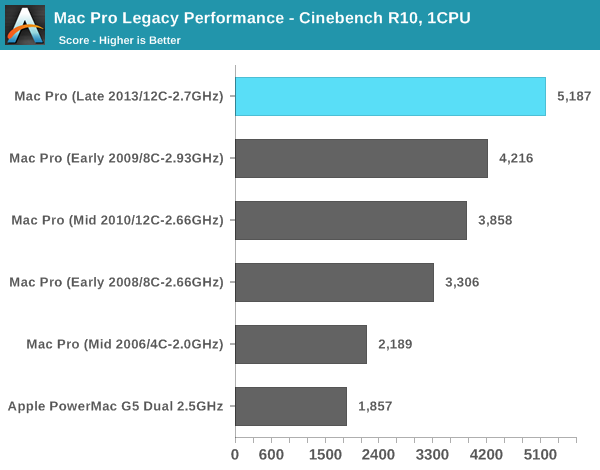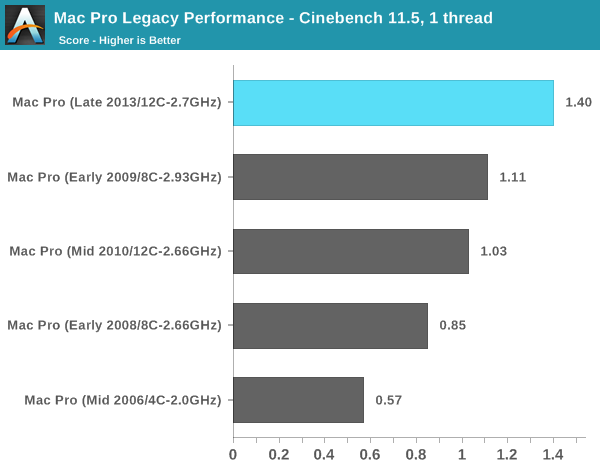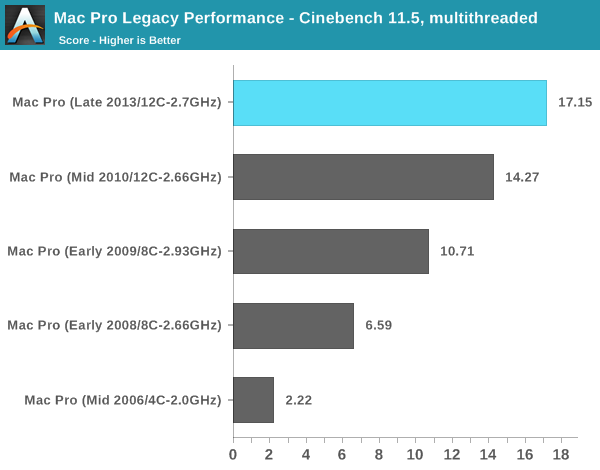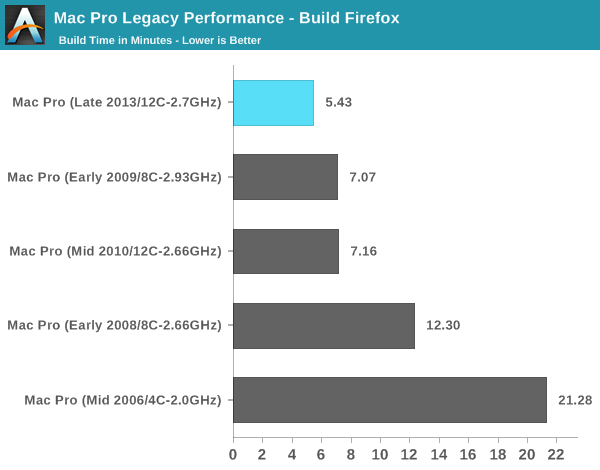The Mac Pro Review (Late 2013)
by Anand Lal Shimpi on December 31, 2013 3:18 PM ESTCPU Performance
I like to have large historical databases of performance so I can put new products in perspective. The Mac Pro and its funny lineage make this a little difficult. For starters, I simply haven't reviewed all of the Mac Pro CPU combinations that have existed over the years. Then there's also the fact that not all of my Mac suite applies well to a 12-core/24-thread Mac Pro. I'm going to try my best to put the new Mac Pro's performance in perspective, but it's going to require a couple of subsections.
Let's first start with a look at the historical performance of the Mac Pro. I really have to thank @elfurberino and @tapbot_paul for lending their time (and their Mac Pros) to help flesh out this comparison. With their help I managed to put together performance data for almost every single generation of Mac Pro.
We'll start with Cinebench R10's single threaded test. Unfortunately the benchmark crashes on Macs with 16+ threads so single threaded performance is all we'll be able to look at:

That's right, I still have my old PowerMac G5 Dual 2.5GHz (upgrade from my original 2.0 model). It's interesting to note that single threaded performance has only improved by 2.8x over that 2.5GHz dual G5 machine from around a decade ago. If we were able to also look at multithreaded performance we'd see a much larger gap. The dual G5's multithreaded performance is actually lower than the single threaded performance of the new Mac Pro's IVB-EP (3346 vs 5187). And the new Mac Pro has 12 of those cores.
Here you can see a very healthy increase in single threaded performance over the 2010/2012 12-core system. The 34% increase in performance is because the Mac Pro never got the Sandy Bridge bump. All previous Mac Pros topped out at Nehalem/Westmere. Couple all of the Sandy Bridge improvements with the much higher peak clock speeds (3.5GHz vs. 3.0GHz) and the performance gains make sense.
The 8C system from early 2009 gives us an example of how it's very possible to have a newer Mac Pro actually perform worse than its predecessor. Apple has done a relatively good job this round of keeping the core count/frequency tradeoffs sensible, but you still have to align your silicon choices to your workload.
Moving on to Cinebench 11.5, we lose the PowerMac G5 comparison but we gain a more modern benchmark. Once again we'll start with the single threaded numbers:

There's that healthy single threaded performance bump again. It is pretty incredible to me just how far we've come in single threaded performance since the mid-2000s. What's even crazier is that 2.0GHz Mac Pro from 2006 is only about 40% faster than a Bay Trail tablet with an Atom Z3770.

The multithreaded story is more evolutionary for sure, especially compared to the previous generation 12-core model. Here we're showing a 20% gain over the previous 12-core design. If you're migrating from a machine with fewer cores you can expect a corresponding increase in multithreaded performance. What is most surprising here is that a 2.3GHz 15-inch MacBook Pro with Retina Display (Late 2013) actually offers better multithreaded performance than the 8-core 2.66GHz Mac Pro from early 2008 in the chart above. The new 15-inch rMBP scores a 6.62 here compared to the 6.58 of that old Mac Pro.
I also shared my Firefox build test with Adam and Paul, who helped me fill out the chart below:

There isn't much of an advantage to having 12 cores here, but the new Mac Pro does deliver an amazingly quick build time compared to anything else. The new Mac Pro is good for around a 24% improvement in build performance compared to the outgoing 12-core model.










267 Comments
View All Comments
sully213 - Tuesday, December 31, 2013 - link
Hi TWiT Live viewers! Happy New Year's!Bone Doc - Wednesday, January 1, 2014 - link
Finally, the authoritative review is here. Happy New Year Anand. Excellent work as always.malcolmcraft - Thursday, October 9, 2014 - link
It's pretty. As for laptops I'd definitly recommend Mac. But when you want a really powerfull workstation to do actuall work at, my first recommendation would not be a Mac. /Matt from http://www.consumertop.com/best-desktop-guide/newrigel - Wednesday, March 1, 2017 - link
man shut up... your PC don't have thunderbolt and and PCIe based storage as a factory build. By the time your done trying to configure a PC with Mac specifications it's almost more money than just buying a Mac Pro Plus you have 10 fans in a PC and water cooling that can leak... PCs suck!DRailroad - Friday, November 22, 2019 - link
A belated (much belated) ABSOLUTELY! Having come from a Windows (I've always abhorred the "PC" reference, most desktops ARE "Personal Computers!") environment, we switched (more like escaped, RAN!) from that execrable platform over 14 years ago to Mac Pros and have never been more productive. But, hey, from experience in that Windows environment, Apple users do NOT want a mass exodus of Windows grunge to the Apple community. The Apple community just doesn't need that ilk with their inherent 'tudes.What I've learned over the years about Windows users, is they love Microsoft due to a sort of Munchhausen by Proxy disorder. The plethora of chronic issues, problems and bottlenecks caused by Windows machines gives users a sense of accomplishment when they have to continuously overcome and resolve the ongoing litany of problems those machines have been famous for! For me and my teams, all those chronic problems only resulted in productivity slowdowns or stoppages, resulting in numerous missed deadlines as well!
;-)
kasthuri - Tuesday, December 31, 2013 - link
great review! hoping that new MBP-Haswell next? happy new year to all!SignalPST - Tuesday, December 31, 2013 - link
yea, when's the Haswell Macbook Pro review coming out?newrigel - Wednesday, March 1, 2017 - link
I thought this is about the Mac Pro why the hell you guys coming hijack of thread?japtor - Tuesday, December 31, 2013 - link
Little correction for the opening, the MacBook name didn't exist until 2006 I think, they were iBooks and PowerBooks back in 2004.Ryan Smith - Tuesday, December 31, 2013 - link
Whoops. Good catch. Thanks.